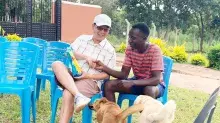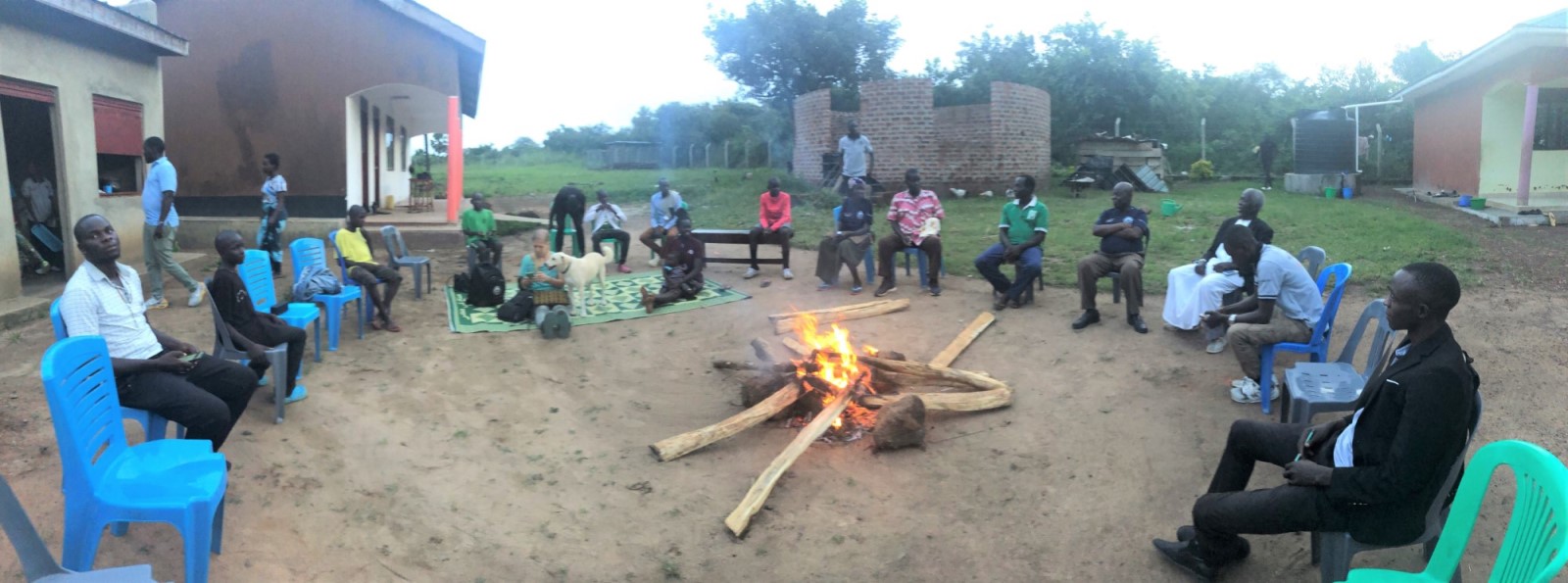
Gathering around a fire and listening to elders share folk stories was a tradition lost years ago in northern Uganda.
A long-lasting and devastating civil war displaced millions of people and cultural practices such as the wang oo fell by the wayside. The fighting ended in 2006 but the effects remain. Feeling the weight of depression and anxiety, young people have been particularly hit hard – and no one’s gathering around a fire to talk about it.
Kwantlen Polytechnic University psychology instructor Dr. Kyle Matsuba aims to change that by reigniting the wang oo and help youth develop skills to cope with the challenges they’re facing.
“The need is great. The consequences are great,” says Matsuba, who is leading the Wang Oo Relit Project.
The project, which takes its name from traditional Ugandan fireside gatherings, is funded by a $250,000 Global Mental Health seed grant from Grand Challenges Canada.
Matsuba recently returned from the East Africa country, where he trained youth mental health leaders who will be key to reintroducing the traditional practice of the wang oo with the help of community elders. Matsuba says the new wang oo gatherings would include sharing of mental health challenges, offering an opportunity to educate young people about mental health.
“Our innovation has the potential to be transformative in establishing time at the end of the day to have youth learn stories from their culture and about mental health, and to develop skills that enable them to effectively cope with the challenges they are facing,” says Matsuba, who is also involving his KPU students in the project.
Matsuba is deeply familiar with Uganda, having previously implemented a mindfulness program in the country’s northern region. And while the program was effective, he found it was difficult to maintain in a place where religious healers are often sought before medical professionals.
“They don’t often necessarily get all the help they need to improve their condition. There is a lot of stigma around this, a lot of misinformation around mental health related issues in this part of the world. Like all countries addressing mental health issues and the stigma around it is important, but probably more so here because so little resources are given to health generally.”
Approximately one-third of Ugandan children screened in health care clinics have symptoms of poor mental health, according to Matsuba. Mental health concerns are even greater in the north due to lingering effects of a 20-year civil war and the psychological and physical traumas that came with it.
Matsuba says his project is resonating with people in Uganda, but it hasn’t come without its challenges, from accessing power and travelling impassible roads to poor mental health knowledge and a current Ebola outbreak.
Nonetheless, Matsuba has hope. His team in Uganda is eager to put into practice what they’re learning.
“They’re also interested because they could take what they were learning and apply it to their own lives,” he says. “Probably the most effective ambassador for any kind of mental health initiative is people that have gone through an experience and can share from a personal perspective.”
Matsuba is planning to return later this fall to further train program leaders before a program is put together and rolled out in the new year. With further grant support, Matsuba hopes to eventually scale up the project to reach more communities in other regions of Africa.
“Having worked with youth leaders before, I didn’t get the same kind of response as this current group has given me, so I’m really optimistic we’re on to something significant here.”
Funded by the Government of Canada and other partners, Grand Challenges Canada funds innovators in low- and middle-income countries and Canada. Its Global Mental Health program aims to seed and transition to scale high impact innovations that support the mental health needs of underserved individuals.

About Grand Challenges Canada
The Wang Oo Relit Project is supported by Grand Challenges Canada, which is funded by the Government of Canada. Grand Challenges Canada funds and supports innovators in low- and middle-income countries and Canada to seed and transition to scale their Bold Ideas with Big Impact®. The aim of Grand Challenges Canada’s Global Mental Health program is to seed and transition to scale high-impact innovations that support the mental health needs of underserved individuals.
